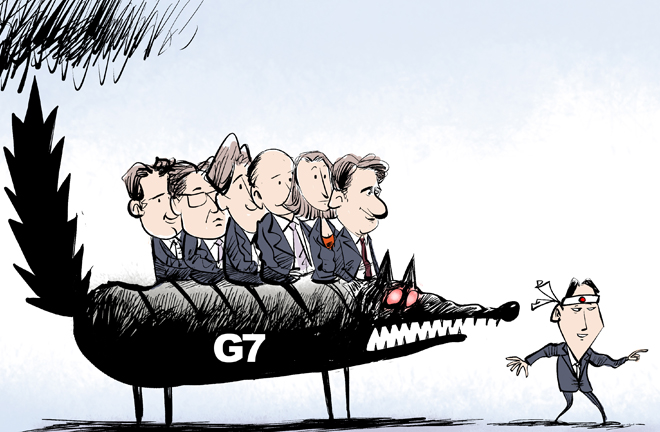WANG GANG: Japan seeks upper hand in sea disputes with G7 agreement

Character assassination of a nation
At a meeting of G7 heads,
Many slanderous words were said.
Japan rallied allies to its cause,
Wolf in sheep’s clothing,
Showed fangs and claws.
Backbiters, dirty fighters,
The world is kindling,
And they stand with lighters.
They sound false alarms,
Of China’s threat.
They worry that,
The Rising Sun will set.
As China’s power waxes,
Theirs does wane,
So they sing the same refrain.
Hoping China can be contained.
But their actions only bring them shame,
And their venomous words are said in vain.
(Cartoon by Gou Ben; Poem by Long Yuan)
The G7 foreign ministers meeting held in mid-April passed a declaration on maritime security expressing concern about the lingering tensions in the sea regions off China’s eastern and southern coasts.
There is no doubt that the statement was directed at China, and it was drafted at the insistence of Japan to serve its own purposes.
First, this is consistent with Japan’s modus operandi of defaming China and is intended to stake a claim to the moral high ground in the disputes between the two nations. Unnerved by the growth of China’s comprehensive national strength relative to Japan in recent years, Japan is becoming less rational and objective in its position on bilateral relations. Criticism of China has become commonplace among some Japanese politicians and the media.
Second, the main goal of Japanese leadership is to appease domestic public opinion. Japanese Prime Minister Shinzo Abe promised to revise the country’s pacifist constitution when he took office for a second term.
Now that the coalition of the Liberal Democratic Party and the New Komeito Party has won the most seats in the House of Councilors and the House of Representatives, the Abe’s government is in a position to further promote an amendment to the constitution during his tenure in office. To justify its actions, the Japanese government has repeatedly stressed the external challenges to its security, and China serves as a convenient bogeyman.
Third, Japan may be using this as an opportunity to divert attention away from historical issues. This year marked the 70th anniversary of the end of World War II, and the international community held various commemorative activities to reflect on the lessons.
As one of the aggressors in the war, Japan’s response to the memorial has become a thorny political issue because neither the Abe government nor conservative political forces are willing to respect history, accept responsibility for the war and recognize the international political order established after WWII.
Furthermore, Abe hinted on many occasions that in the coming speech on the 70th anniversary of WWII, he would not use words like “aggression” and “colonial rule,” as his predecessors had previously done.
The Japanese government’s aggravation of problems in China’s coastal areas while the world is remembering the horrors of a war it helped to start can draw the attention of the international community away from Japan’s attitudes toward these historical issues.
The issue of the declaration seems to be a diplomatic victory for Japan, but it is harmful to China-Japan relations. Though there were signs of mitigation and active governmental, non-governmental exchanges after Chinese President Xi Jinping talked with Abe during the APEC meeting last November, the Japanese government hasn’t changed its positions and attitudes on historical and territorial issues.
On one hand, some Japanese citizens expect friendly relations, economic cooperation and cultural, personal exchanges between the two nations. On the other, the conservative forces, some media and radical voters see China-Japan relations as competitive and blame China for domestic woes. The latter group has had great influence on Japanese society in the past few years, which has shifted the political landscape to the right.
Though Abe and his administration must heed the appeals of both sides when making policies regarding China, his own political ideas and the interests of the Liberal Democratic Party he represents make him inclined to support the forces hostile to China, and in doing so, he jeopardizes China-Japan relations.
Japan has made more than one attempt to rally allies at G7 summits to support its criticism of China but all failed. The “breakthrough” this time could be attributed to changing interests of the G7 members.
Japan’s move is in line with the intention of the US, which originally condemned China’s legal attempts to safeguard its maritime rights. Moreover, Britain, France, Germany, Italy and Canada acquiesced to Japan’s position.
First, in the context of the decay of old powers and the rise of emerging nations, G7 members are keen to show unity to prove that the G7 framework still has great influence on international affairs. Second, Britain, France, Germany and Italy joined the China-proposed Asian Infrastructure Investment Bank despite opposition of the US, which has irritated the US and also embarrassed Japan.
This agreement can be seen as an attempt to repair damaged alliances. Finally, Britain and France are attempting to make their voices in international discourse in order to give themselves leverage in diplomacy with China.
Wang Gang is from the Department of Japanese Studies at the University of International Relations.
